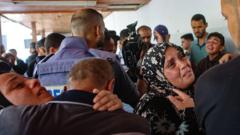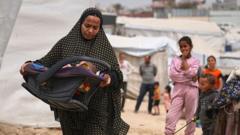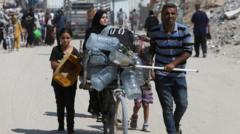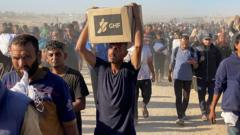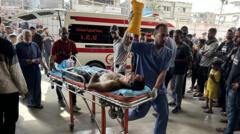The harsh realities of war are particularly damning for expectant mothers and newborns in Gaza, where soaring malnutrition and lack of healthcare are resulting in increased risks for pregnancy and childbirth. Amid ongoing conflict, many women are left in despair as they grapple with inadequate medical support and the loss of their infants.
Dire Circumstances for Mothers and Newborns in Gaza Amid Ongoing Conflict
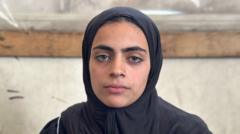
Dire Circumstances for Mothers and Newborns in Gaza Amid Ongoing Conflict
Pregnant women and newborns face an escalating crisis in Gaza as the situation worsens under constant bombardment and blockade, hampering access to essential medical care and nutrition.
Amid the ongoing conflict in Gaza, pregnant women and newborns are suffering greatly from deteriorating health conditions exacerbated by a severe blockade and relentless bombardment. According to the UN, the dire conditions have led to one in ten births resulting in underweight or premature babies, alongside alarming rates of miscarriages, stillbirths, and congenital issues.
Malak Brees, who is seven months pregnant, expressed her fears about the bombardment and its effect on her pregnancy. "I'm scared for my baby," she shared with the BBC, "especially after losing amniotic fluid due to malnutrition."
The Israeli blockade, intensified since March 2, has complicated matters significantly. Basic medical supplies, including painkillers and hygiene products, are scarce, and many women are forced to give birth at home without proper medical assistance. Sandra Killen, an American nurse who has been working in Gaza, highlighted the inadequacies women face when discharged from hospitals just hours after giving birth, despite often battling severe health complications.
With the local health infrastructure overwhelmed due to ongoing airstrikes, the Nasser hospital remains one of the few facilities that can handle neonatal care; yet, it is also experiencing a surge in patients because a nearby hospital has been rendered inoperable. Malnutrition has become a critical issue, as expectant mothers are denied adequate prenatal care and nutrition.
The experiences of Aya al-Skafi illustrate the heart-wrenching realities for many. After her baby Jenan was born healthy, the severe restrictions on food and medical supplies led to a tragic decline in the infant's health. Despite Aya's desperate pleas for help, Jenan succumbed to malnutrition.
Organizations like the Gaza Infant Nutrition Alliance are attempting to provide support, particularly in promoting breastfeeding among mothers who are themselves malnourished. However, many mothers are unprepared for the challenges that lie ahead, especially as they often lack the basic necessities for nurturing their newborns.
Tragic stories abound, with many mothers losing their children during birth or soon after due to the unavailability of medical care. The psychological toll is immense, as highlighted by Dr. Ahmad al-Farra, who noted the desperation felt by women who know their health and that of their babies is inadequately monitored during this fraught time.
The increasing chaos and uncertainty surrounding childbirth in Gaza serve as a stark reminder of how war reshapes the most fundamental experiences of life. Rather than joy and hope, new life now represents the struggle for survival amidst relentless adversity. The stories of mothers who have lost their babies and the ongoing health crisis are testament to the urgent need for humanitarian support and intervention.




